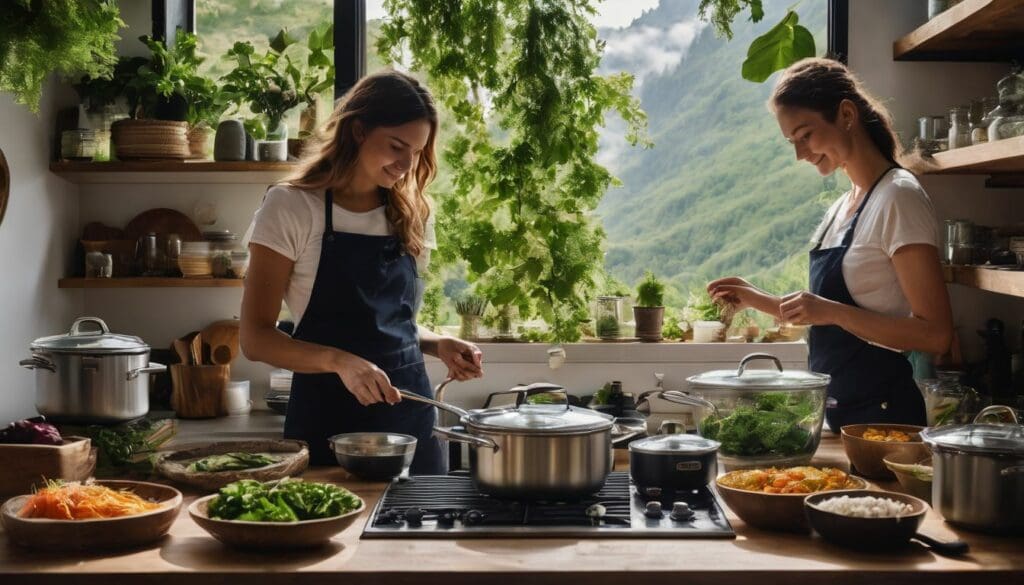Navigating the cookware aisle in pursuit of sustainability can feel quite the daunting task. We’ve all been there, haven’t we? Trudging through row upon row of pots and pans, trying to discern which option treads most lightly on our precious Earth.
Did you know that a remarkable 60% of aluminium used in pots and pans is fully recyclable? Let’s embark together on a journey where culinary adventures meet environmental stewardship.
Join us as we uncover delightful ways to ensure your kitchen becomes a beacon of eco-friendliness without compromising on sparkle!
Key Takeaways
- Eco-friendly cookware includes items made from sustainable materials like recycled or renewable resources and feature non-toxic coatings, offering a healthier option for both people and the planet.
- Traditional cookware can emit harmful chemicals when exposed to high heat, whereas eco-friendly options prevent this risk by using natural materials such as stainless steel, ceramic-nonstick coatings, or enameled cast iron.
- Choosing eco – friendly cookware brands that are committed to sustainability can support conservation efforts; look for certifications such as B Corporation or USDA Organic to ensure ethical standards.
- Caring properly for your eco-conscious kitchen tools—by avoiding toxic cleaning chemicals and harsh scrubbing—extends their lifespan and maintains their non-toxic properties.
- Investing in a variety of essential pieces within an eco – friendly cookware set ensures versatility in cooking methods while reducing waste by minimising the need for frequent replacements.
Eco-Friendly Cookware: What is It and Why is It Important?
Eco-friendly cookware refers to kitchen utensils and cookware made from sustainable and non-toxic materials, designed to reduce environmental impact. It is important because traditional cookware can release harmful chemicals into our food and the environment, while eco-friendly alternatives offer health benefits and support conservation efforts.
Definition of eco-friendly cookware
Eco-friendly cookware means pots, pans, and utensils that are kind to our planet. They’re made from sustainable materials like recycled or renewable resources, use non-toxic coatings, and create less waste during production.
We choose these items because they don’t release harmful chemicals into our food or the environment when we cook.
Using this type of cookware also cuts down on energy consumption. The designs often focus on efficient heat distribution which lets us save power while whipping up meals. By picking eco-conscious kitchen tools, we not only safeguard our health but also contribute to preserving natural ecosystems.
It’s a simple change in our kitchens that can lead to big positive impacts for the earth.
Environmental impact of traditional cookware
The production and use of traditional cookware, such as non-stick pans with polytetrafluoroethylene (PTFE), can release harmful chemicals into the environment. When these pots and pans are manufactured, toxic by-products are often generated, contributing to air and water pollution.
Additionally, when exposed to high heat during cooking, PTFE coatings can emit fumes that are harmful to human health and the environment. Furthermore, the disposal of non-biodegradable traditional cookware adds to landfill waste, further impacting the planet’s fragile ecosystem.
Metallic aluminium cookware poses another environmental concern due to its extraction process which requires a significant amount of energy consumption and releases greenhouse gases.
Benefits of using eco-friendly cookware
After understanding the environmental impact of traditional cookware, it’s essential to recognise the benefits of using eco-friendly alternatives. Eco-friendly cookware offers a non-toxic and sustainable option for cooking, ensuring that harmful chemicals do not leach into food.
This type of cookware is made from natural materials like stainless steel, ceramic nonstick coatings, or enamelled cast iron, reducing the carbon footprint in our kitchens. Additionally, eco-friendly cookware is durable and long-lasting, promoting sustainability by minimising waste and frequent replacements while also being easy to clean and maintain.
Investing in eco-friendly kitchen utensils and nontoxic pots and pans not only supports our health but also promotes environmentally responsible practices. By choosing sustainably sourced cooking equipment, we contribute to conserving the planet’s resources while creating a safe environment for ourselves and future generations.
Types of Eco-Friendly Cookware
When it comes to eco-friendly cookware, there are various types to choose from, including ceramic-coated, hard-anodised aluminium, stainless steel and enameled cast iron. Each type has its own unique benefits and features that make them a sustainable choice for your kitchen.
Ceramic-coated
Ceramic-coated cookware offers a non-toxic and eco-friendly alternative to traditional non-stick pans. The ceramic coating provides a smooth, easy-to-clean surface that eliminates the need for excessive oil or butter, promoting healthier cooking practices.
Additionally, this type of cookware is free from PFOA and PTFE, harmful chemicals found in many non-stick coatings, making it a safer option for both the user’s health and the environment.
Its durability also ensures longevity, reducing the need for frequent replacing and minimising waste.
When using ceramic-coated cookware, it’s important to avoid using metal utensils as they can cause scratches on the surface. Instead, opt for wooden or silicone utensils to maintain its integrity and prolong its lifespan.
Hard-anodised aluminium
Hard-anodised aluminium cookware is durable and scratch-resistant, making it a popular choice for environmentally conscious individuals seeking sustainable kitchenware. It offers excellent heat distribution, reducing energy consumption when cooking.
The non-toxic nature of hard-anodised aluminium makes it an eco-friendly option that eliminates harmful chemicals from leaching into food. This type of cookware is also easy to clean and maintain, contributing to its longevity and sustainability.
The hard-anodised process creates a layer of oxide on the surface of the aluminium, enhancing its resistance to corrosion and wear, making it an ideal choice for those interested in investing in long-lasting, environmentally responsible cookware.
Stainless steel
Stainless steel cookware is extremely durable and resistant to corrosion, making it a long-lasting and sustainable choice for environmentally conscious individuals. It is also non-reactive, which means there’s no risk of harmful chemicals leaching into your food.
Additionally, stainless steel pans are easy to clean, requiring only soap and water, which reduces the need for harsh chemical cleaners that can harm the environment. Choosing stainless steel cookware supports conservation efforts by reducing waste from frequently replaced items.
When considering eco-friendly kitchen utensils, stainless steel should be at the top of your list due to its longevity and minimal environmental impact. Its versatility makes it suitable for various cooking methods and ingredients while being free from potentially harmful substances found in other materials like aluminium or non-stick coatings.
Enameled cast iron
Enameled cast iron cookware combines the durability of cast iron with a smooth, easy-to-clean enamel finish. It is a versatile option for environmentally conscious cooks seeking long-lasting, non-toxic cookware.
This type of cookware retains heat well and distributes it evenly, making it suitable for various cooking methods like frying, searing, braising or baking. Its non-reactive surface means it won’t leach into food or react with acidic ingredients.
Enameled cast iron also requires minimal oil due to its natural non-stick properties.
Top Eco-Friendly Cookware Brands
In the market for eco-friendly cookware, there are plenty of brands to choose from. Some reputable names include Caraway, Great Jones, Our Place, Kana, Xtrema, and Material. Each brand offers a variety of sustainable options to suit different cooking needs and preferences.
Caraway
Caraway offers a range of eco-friendly cookware that is thoughtfully designed to be both sustainable and stylish. The products are free from harmful chemicals such as PFOAs, lead, and cadmium, making them safe for the environment and your health.
The brand’s non-stick ceramic coating ensures easy cooking and cleaning while also being durable and long-lasting. Caraway cookware is crafted with responsibly sourced materials, reducing its environmental impact while maintaining high performance in the kitchen.
With a focus on quality, safety, and sustainability, Caraway provides an ideal option for environmentally conscious individuals seeking nontoxic and earth-friendly kitchen utensils.
The sleek design of Caraway’s cookware not only enhances the aesthetic of your kitchen but also contributes to a greener lifestyle by prioritising sustainability without compromising on functionality.
Great Jones
Great Jones offers a range of eco-friendly cookware that is both functional and stylish. The brand’s products are designed with sustainability in mind, using non-toxic materials and promoting responsible manufacturing processes.
Great Jones’ cookware is durable and versatile, making it suitable for a wide range of cooking needs. With options like ceramic-coated pots and pans, their collection provides environmentally conscious individuals with high-quality kitchen tools that align with their values.
The brand’s commitment to using natural materials for cooking ensures that their products are safe for the environment and health-conscious consumers. Great Jones stands out as a top choice for those seeking sustainable cookware without compromising on performance or aesthetic appeal.
Our Place
Our Place offers a range of eco-friendly cookware designed to reduce environmental impact. Their products are carefully crafted with sustainable materials and non-toxic coatings, ensuring that your cooking experience is both safe and environmentally friendly.
Our Place’s thoughtfully designed cookware not only minimises the use of harmful chemicals but also promotes sustainability in the kitchen, making it an ideal choice for conscientious consumers seeking nontoxic and green culinary tools.
Now let’s delve into another crucial aspect of eco-friendly cookware: how to choose the right set that aligns with your sustainability goals and meets your cooking needs.
Kana
We appreciate Kana’s commitment to sustainability and eco-consciousness. The brand offers a range of non-toxic cookware options, including ceramic-coated and stainless steel pots and pans that are free from harmful chemicals.
Kana’s products are durable and designed to last, helping reduce the environmental impact of kitchen utensils. With an emphasis on both performance and eco-friendliness, Kana provides environmentally conscious individuals with reliable choices for their culinary needs.
Moving on to “Xtrema,” let’s explore another top eco-friendly cookware brand known for its innovative approach to sustainable kitchen equipment.
Xtrema
Xtrema is a leading brand of eco-friendly cookware, offering a range of nontoxic and environmentally friendly kitchen utensils. With its innovative ceramic nonstick technology, Xtrema provides safe and green cookware options for conscious consumers.
Their products are free from toxic chemicals, ensuring that cooking equipment is both ecoconscious and safe for the environment. Xtrema’s commitment to sustainability also extends to their manufacturing process, making their culinary products ideal for those seeking organic and earthfriendly kitchenware.
When considering top eco-friendly cookware brands, Xtrema stands out as a reliable choice for environmentally conscious individuals looking to support conservation efforts.
Material
When considering eco-friendly cookware, the material used plays a crucial role in its sustainability and impact on the environment. Look for materials like hard-anodised aluminium, stainless steel, and ceramic-coated options that are free from harmful chemicals such as PFOA and PFAS.
These materials not only ensure non-toxic cooking but also offer durability and longevity, reducing waste in the long run.
Additionally, enamelled cast iron is another environmentally conscious choice due to its natural composition and energy-efficient cooking properties. Being mindful of the materials used in eco-friendly cookware contributes to a healthier planet while promoting sustainable living practices.
How to Choose the Right Eco-Friendly Cookware
When choosing eco-friendly cookware, it’s important to consider the heating capacity, included pieces in a set, warranty, and sustainability certifications. These factors can help you make an informed decision when selecting the right environmentally friendly cookware for your kitchen.
Heating capacity
When choosing eco-friendly cookware, it’s essential to consider the heating capacity. Opt for cookware with excellent heat retention and distribution properties, ensuring efficient cooking without hotspots.
Look for materials like copper and aluminium cores which provide even heat distribution, reducing energy consumption and providing consistent cooking results. This helps in saving both time and energy while promoting a more sustainable approach to cooking.
Consider the type of stovetop you have when evaluating heating capacity. Induction stoves require compatible cookware with magnetic properties for optimal performance, so be sure to check for induction compatibility if needed.
Included pieces
When considering eco-friendly cookware, it’s important to pay attention to the included pieces. Look for sets that offer a variety of essential items such as saucepans, skillets, and stockpots.
Also, consider additional pieces like lids and utensils which can complement the cookware set. Opting for a set with multiple pieces ensures that you have all the necessary tools for various cooking needs without needing to rely on traditional non-eco-friendly options.
Ensure that the included pieces are versatile and suitable for different cooking methods including stovetop cooking, oven use, or even induction cooking if needed. This versatility will not only cater to your current kitchen needs but also remain relevant if your cooking habits evolve over time.
Warranty
When considering eco-friendly cookware, it’s crucial to review the warranty. The warranty outlines the manufacturer’s commitment to product quality and durability, providing protection against defects and damage.
Look for a comprehensive warranty that covers both manufacturing defects and normal wear and tear. Additionally, ensure that the warranty aligns with your sustainability values by choosing cookware from brands that offer eco-friendly warranties, reflecting their dedication to long-lasting, nontoxic products.
Moving on to “Sustainability Certifications,” understanding these certifications can guide you towards truly environmentally friendly cookware options.
Sustainability certifications
When considering the purchase of eco-friendly cookware, it’s important to look for sustainability certifications. These certifications ensure that the cookware meets specific environmental and ethical standards, giving you peace of mind that you are making a truly sustainable choice.
Look for well-known certifications such as B Corporation, USDA Organic certification, or Energy Star rating when selecting your eco-friendly cookware. These certifications guarantee that the products have been vetted for their sustainability practices and adherence to environmentally friendly manufacturing processes.
In addition to these broader certifications, there may also be specific organisations or labels related to sustainable materials used in cookware, such as recycled content or responsibly sourced materials.
Care and Maintenance for Eco-Friendly Cookware
Proper care and maintenance of eco-friendly cookware is essential for ensuring its longevity and sustainability. Avoid using toxic chemicals, follow the recommended cleaning methods, and handle the cookware with care to keep it in excellent condition.
Proper cleaning methods
To keep eco-friendly cookware in top condition, use gentle cleaning methods to avoid damaging the non-toxic surfaces. Rinse with warm water and mild dish soap, then gently scrub with a non-abrasive sponge or cloth to remove any food residue.
Avoid harsh chemical cleaners as they can deteriorate the nontoxic coating of the cookware.
When drying, air dry is best to preserve the integrity of eco-friendly cookware. If hand-drying, use a soft towel to prevent scratching or damaging the surface. Regularly inspect for wear and tear and replace any damaged pieces promptly to maintain their eco-friendly benefits.
Avoiding toxic chemicals
When caring for eco-friendly cookware, it’s crucial to avoid toxic chemicals that can harm both your health and the environment. Check cleaning products for harmful substances such as chlorine bleach or ammonia, and opt for natural alternatives like vinegar or bicarbonate of soda.
Avoid using abrasive materials and harsh scrubbing pads that may damage the non-toxic coating of your cookware. By being mindful of the chemicals you use, you can ensure a safe cooking environment while preserving the longevity and sustainability of your eco-conscious kitchen tools.
It’s important to be vigilant about avoiding toxic chemicals not only in cleaning but also when selecting new cookware. Look for labels indicating that items are free from PFOA, PFAS, lead, cadmium, and other harmful substances often found in traditional non-stick coatings.
Longevity and sustainability of eco-friendly cookware
To ensure the longevity and sustainability of eco-friendly cookware, it is important to follow proper care and maintenance practices. Regularly cleaning and drying the cookware thoroughly after each use can prevent wear and tear, extending its lifespan.
Additionally, avoiding harsh chemicals and abrasives during cleaning helps preserve the non-toxic properties of eco-friendly cookware. Choosing high-quality brands with strong warranties and sustainability certifications also contributes to long-term sustainability, ensuring that your cooking equipment remains environmentally friendly for years to come.
Furthermore, investing in durable materials such as stainless steel or hard-anodised aluminium enhances the longevity of eco-friendly cookware, reducing the need for frequent replacements which ultimately supports conservation efforts.
Conclusion
In conclusion, making the switch to eco-friendly cookware is a simple yet impactful way to reduce our environmental footprint. These pots and pans not only promote healthier cooking but also contribute to a sustainable kitchen.
By choosing eco-conscious cookware, we are taking a step towards supporting conservation and preserving our planet for future generations. Making informed choices about the products we use in our kitchens can make a real difference in promoting a greener and healthier world for all of us.
FAQs
1. What makes cookware eco-friendly?
Eco-friendly cookware includes items like nontoxic cooking equipment and pots, pans made from materials that are safe for the environment and your health.
2. Can I find nonstick options in eco-conscious kitchen utensils?
Absolutely! You can choose ceramic nonstick cookware which is both ecoconscious and provides a great non-toxic frying pan option.
3. Are there any environmentally friendly pots and pans that are also durable?
Certainly! Ecofriendly kitchen utensils designed with durability in mind ensure you get long-lasting use without harming the planet.
4. How do green chef supplies benefit my cooking experience?
Using green cooking utensils crafted from organic materials can improve your cooking while keeping toxic chemicals away from your food.
5. Where can I learn more about choosing the right nontoxic cookware?
For guidance on selecting safe cookware that aligns with an eco-conscious lifestyle, “A Guide to Eco-Friendly Cookware” offers up-to-date advice on making these decisions.





